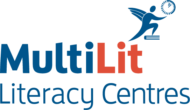Inspired by the joy of working to educate students, Damian Rapisarda is currently studying to become a teacher. He puts his studies to practical use as a tutor at MultiLit Literacy Centres, delivering our evidence-based programs to help students improve their literacy skills.

Tell us a bit about your background, experience and what inspired you to get into education.
After following in my father’s footsteps and working in construction, then living in England for six months, I took a role for Cricket NSW. This was great for me because the majority of my work was with children, and I discovered my passion for working with and educating students.
I have a lot of friends who are teachers and who recommended the career to me. I really enjoyed working with children, so it seemed like an excellent choice.
So, I began on the education path two years ago. Now, I have two years left of my Bachelor of Primary Education at Australian Catholic University at Strathfield, and I hope to one day be a school principal.
What are some of the key responsibilities in your role?
As a tutor at MultiLit Literacy Centres, I work one-on-one with students, taking them through MultiLit programs including MiniLit Sage, the Reading Tutor Program (RTP) and MacqLit. Since completing three weeks of university placement, I have been completing initial assessments with new students, to help determine which of our programs is best for their specific needs.
I also help with some administrative tasks to ensure the Literacy Centre runs smoothly.
What do you like most about your work with MultiLit?
I really enjoy working with the students and seeing them improve over the term. Especially in our environment where many students begin with very low skills and are quite reluctant readers, it is very rewarding seeing them improve and to be able to help them in that way.
What’s one thing you wish more people knew about literacy?
One thing I wished people knew is the importance of phonics and decodable readers. I have recently completed a placement at a school and discovered just how hard the English language can be for some students. A number of the students I worked with had to rely on their own word knowledge rather than being able to break the words down using phonics. You can really see how valuable phonics and decodable readers are for success in literacy.
